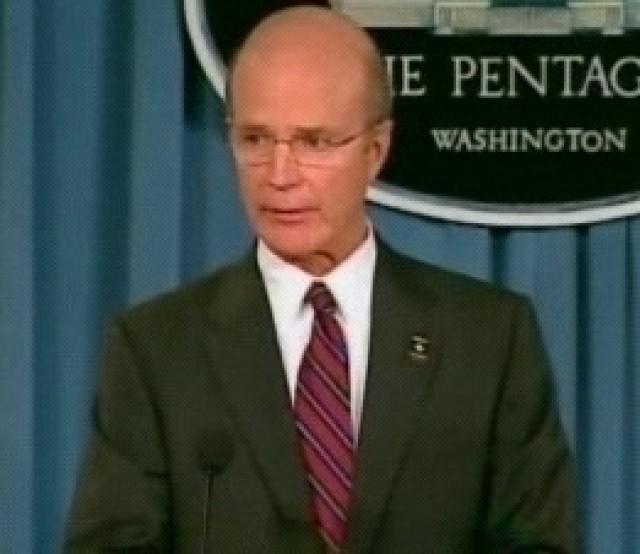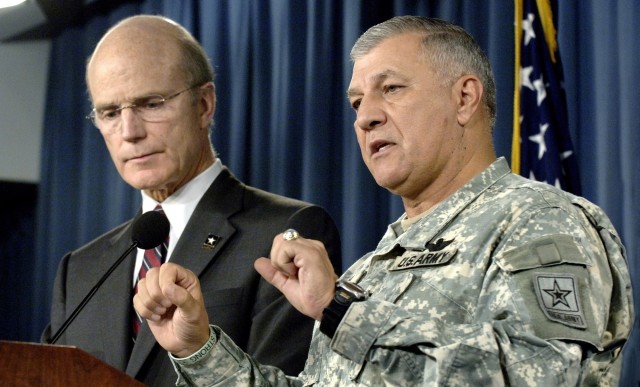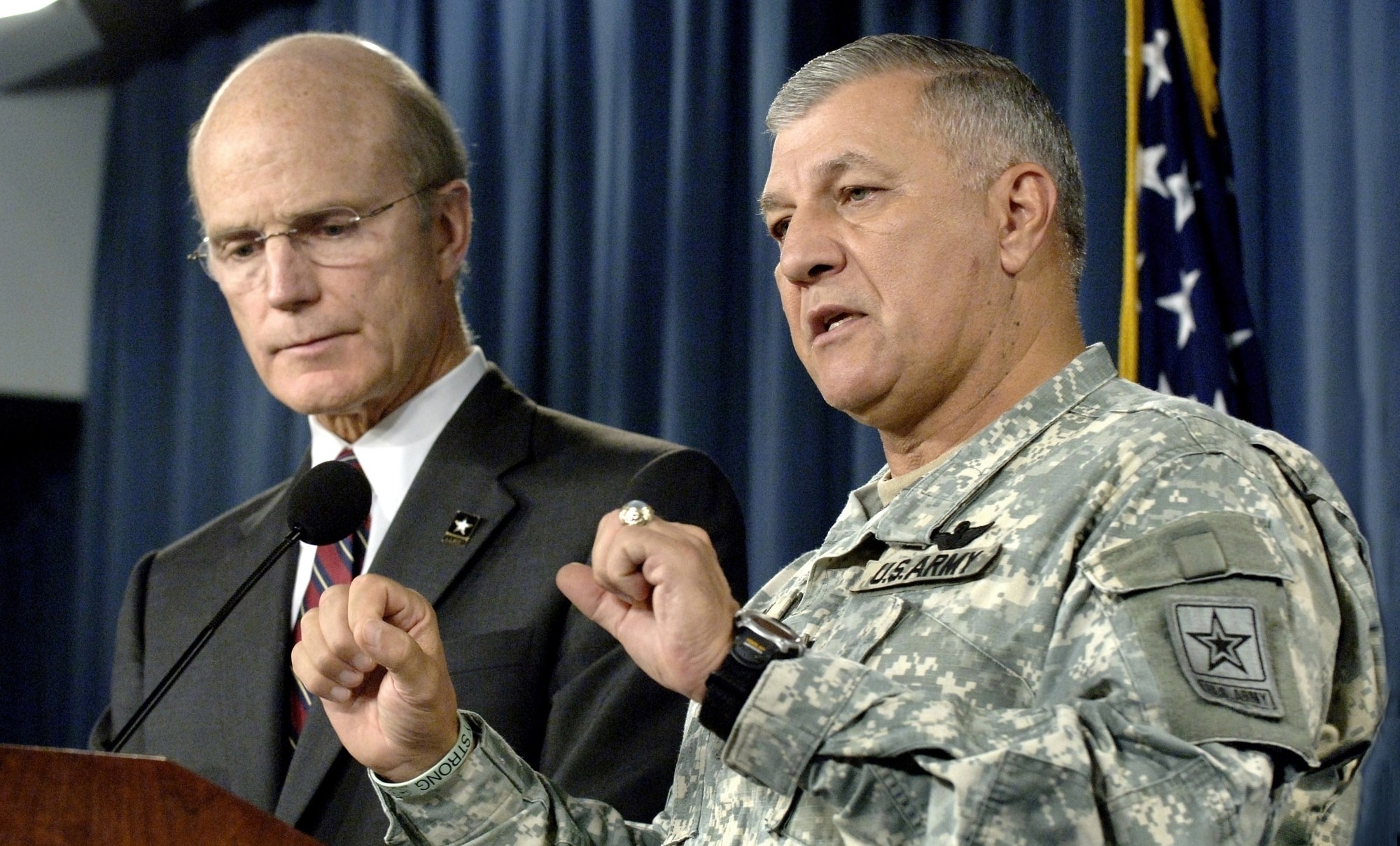WASHINGTON (Army News Service, Aug. 1, 2007) - The Army's senior civilian announced today that a retired three-star general will receive a letter of censure as the result of a review of previous military investigations into the death of Cpl. Patrick D. Tillman.
Secretary of the Army Pete Geren said a "perfect storm" of events initially obfuscated the facts regarding the April 22, 2004, death of Cpl. Tillman, an Army Ranger who was killed by friendly fire near the Afghanistan-Pakistan border. Cpl. Tillman, a former National Football League star, was initially reported to have died as a result of enemy fire.
After reading a review of previous investigations performed by Gen. William S. Wallace, commander of U.S. Training and Doctrine Command, Sec. Geren said he decided to issue a letter of censure to retired Lt. Gen. Philip Kensinger, who'd commanded U.S. Army Special Operations Command at the time of Tillman's death.
"I believe the buck stops with General Kensinger," Sec. Geren said. "He was the senior leader in the chain of command for administrative control for the 75th Ranger Regiment."
If Lt. Gen. Kensinger "had performed his duty, we wouldn't be standing here today," Sec. Geren said to reporters at a Pentagon news conference yesterday.
Sec. Geren cited Lt. Gen. Kensinger for multiple failures, including failing to initiate a timely Army safety investigation into Cpl. Tillman's death; giving false statements during follow-on investigations; and failing to notify the Tillman family about the fratricide investigation; failing to notify then-acting Secretary of the Army Les Brownlee about the friendly fire investigation.
Lt. Gen. Kensinger should have convened a safety board upon being notified that Cpl. Tillman died from friendly fire, Sec. Geren said.
"That safety board would have been an outside group of eyes. It would have gone into theater and it would have immediately commenced an investigation," Sec. Geren pointed out. The safety board "would have added an outside chain-of-command review of this situation, as well as recommendations on how we make sure it didn't happen again," he added.
Lt. Gen. Kensinger, responsible for notifying then-Spc. Tillman's relatives that the cause of the Soldier's death was under investigation, didn't, Sec. Geren said.
Information surrounding Cpl. Tillman's death was initially closely held by officers and enlisted members of his unit, the 2nd Battalion, 75th Ranger Regt. That's partially because the unit's mission was classified, and also because officials were waiting for the initial investigations to be concluded, approved and released, Gen. Richard A. Cody, the vice chief of staff of the Army, said at the news conference.
Cpl. Tillman's family was first told their son had died by enemy fire. They weren't told he'd been mistakenly shot by U.S. troops until weeks after his death. His parents should have been notified much sooner that the Soldier had actually died by friendly fire, Gen. Cody said.
"The mission that they were on in Afghanistan was a classified mission," Gen. Cody confirmed. However, Cpl. Tillman's family should have been notified about his death and if there were any questions as to how he died, Gen. Cody added.
"And, that's where this thing broke down," he said.
Yet, "all the investigations found that everybody was trying to seek the truth and be 100 percent sure" that Cpl. Tillman was killed by friendly fire, he said.
Sec. Geren also has directed an Army grade determination board to evaluate Lt. Gen. Kensinger's performance as a lieutenant general. If Lt. Gen. Kensinger's performance at the time is found wanting by the board, his retired rank could be reduced by one star to major general, affecting his retired pay and benefits.
Gen. Wallace reviewed 10 Soldiers for possible fault as part of the Cpl. Tillman investigations. Seven Soldiers, including Lt. Gen. Kensinger, received non-judicial punishment.
On March 26 the Army announced that a Department of Defense inspector general's report and a U.S. Army Criminal Investigation Command inspection agreed that Cpl. Tillman had been accidentally shot and killed by members of his own unit. The CID report concluded there was no criminal intent involved with the death, noting Soldiers in Cpl. Tillman's unit bore him no ill will.
Sec. Geren and Gen. Cody apologized to Cpl. Tillman's family, noting there was no intentional cover up over the circumstances of his death. Cpl. Tillman justly received the Silver Star medal for his service in Afghanistan, Sec. Geren said.
The Army "mishandled this matter from very early on," Sec. Geren said, noting he understood how Cpl. Tillman's family and many other Americans could conclude there was a cover up.
However, "the facts just don't support that conclusion," the secretary asserted.
"The facts show clearly that there was no cover up. There was misinformed action on the part of multiple Soldiers and you had a 'perfect storm' of mistakes by many Soldiers," Sec. Geren said.
It is long-standing defense department policy to not discuss any type of sanctions for officers below general officer grade, Sec. Geren said.
"So, everybody else that was reviewed by General Wallace or was sanctioned as a member of the Ranger team were below general officer grade and we don't discuss those sanctions publicly," Sec. Geren said.
(Gerry J. Gilmore writes for American Forces Press Service.)




Social Sharing